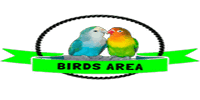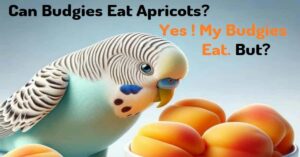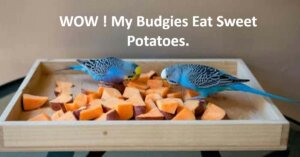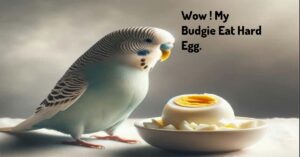Can Budgies Eat Insects? (Is It Safe)
Yes, budgies can eat insects, but they don’t need to. Offer them occasionally as a treat, ensuring they’re safe and clean, but stick mainly to seeds, vegetables, and fruits for a balanced diet.
Budgies are vibrant, playful birds typically fed a diet of seeds, fruits, vegetables, and pellets. A common question is whether budgies can eat insects. Yes, they can, but it’s not essential for their diet. Many budgies thrive without ever eating bugs.
This guide will detail everything about feeding insects to budgies, including safe types, potential benefits, and expert opinions.
By the end, you’ll know if offering insects is a good choice for your budgie.
Can Budgies Eat Insects?
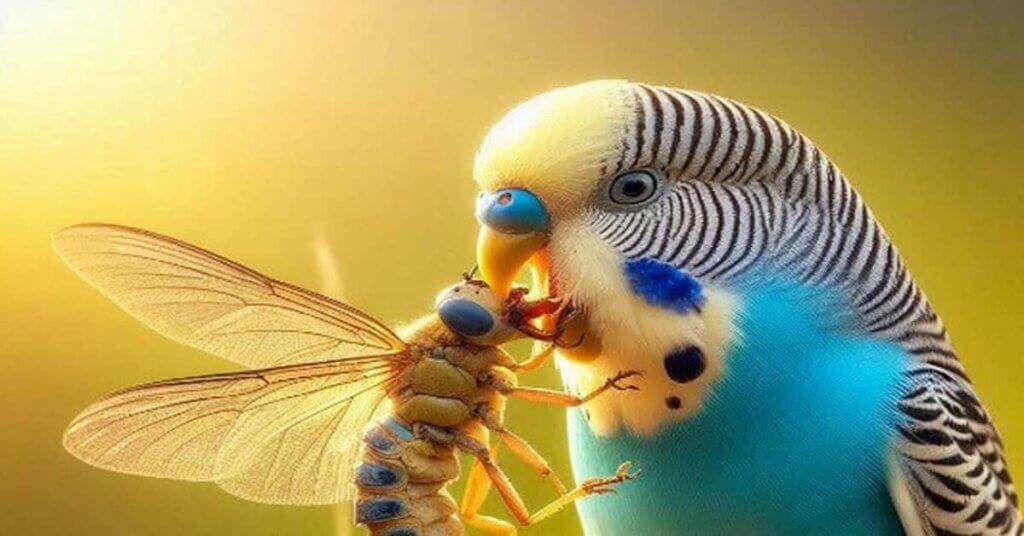
Yes, budgies can eat insects, but they don’t need them. In their natural habitat, budgies eat a variety of seeds, fruits, and vegetation, and occasionally, they may consume tiny insects. However, unlike other birds, such as sparrows or finches, budgies do not rely on insects as a primary food source.
Insects can be offered as an occasional treat, especially if you want to provide variety to your budgie’s diet. However, it’s essential to understand that budgies do not require insects for nutrition, and there are other, more suitable foods to meet their needs.
What Types of Insects Can Budgies Eat?
If you choose to give insects to your budgie, it’s crucial to stick to safe and appropriate options.
Here are some of the insects that are considered safe for budgies:
- Mealworms: These are probably the most common insect treat for birds. They’re soft, easy to digest, and are available at pet stores as live or dried options.
- Crickets: Another popular insect option, crickets can be fed to budgies, but it’s essential to ensure they are clean and pesticide-free.
- Ants: Although budgies in the wild might consume ants while foraging, feeding ants to a pet budgie is not essential. If you do, make sure they are pesticide-free.
Ensure that any insects offered to your budgie are safe, clean, and free from harmful chemicals. Avoid feeding them wild-caught bugs, as these could carry parasites or toxins that could ill your bird.
Read more
Are Insects Necessary for Budgies?
Insects are not necessary for a budgie’s diet. Budgies primarily thrive on a balanced diet of seeds, grains, fresh vegetables, and specially formulated bird pellets. These provide all the necessary nutrients, including protein, vitamins, and minerals.
In the wild, insects may make up a tiny portion of their diet, particularly when food is scarce, but this is more out of necessity than preference.
For a domesticated budgie, there is no need to introduce insects into their diet regularly. You can provide them as an occasional treat, but it’s not something you should prioritize.
How Often Can Budgies Eat Insects?
Since insects are not a staple part of their diet, limiting the amount you offer to your budgie is essential. If you do decide to give them insects, make it a special treat rather than a regular meal.
Once or twice a month is more than enough. Overfeeding insects could lead to digestive issues or weight gain, especially since they are not a natural part of your budgie’s primary diet.
Offering too many insects can also reduce the balance of nutrients your bird gets from its regular food. Remember, variety is key, but it’s always best to stick to what budgies naturally eat.
Benefits of Insects for Budgies
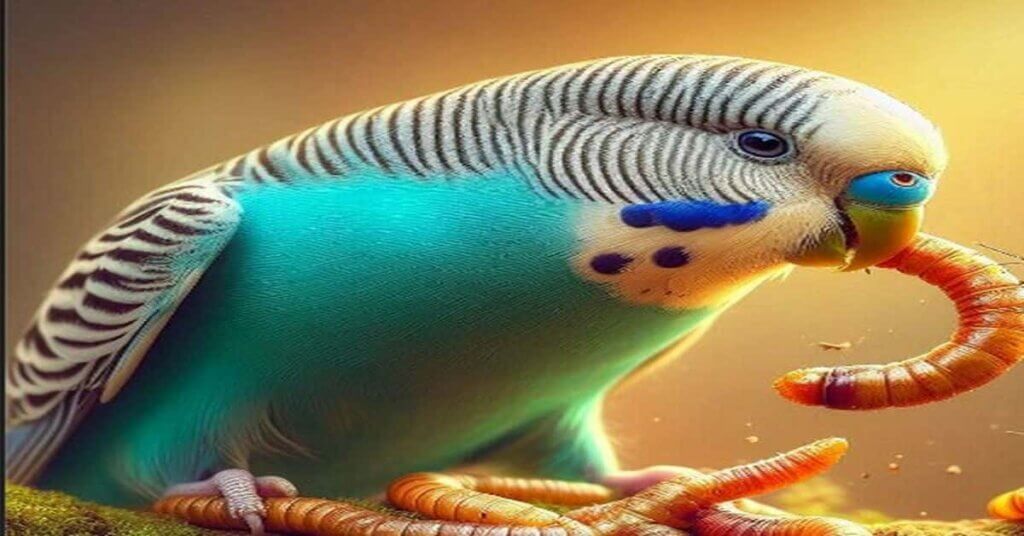
Insects contain high levels of protein, which can be beneficial for birds during certain times, such as during the breeding season or when they are molting.
However, budgies can get enough protein from their regular diet of seeds, grains, and vegetables, so insects are not needed as a protein source.
If you do offer insects, it can be a fun and enriching experience for your budgie. The texture and taste of insects may provide stimulation and variety, which can be mentally rewarding for birds.
Here are a few potential benefits of feeding insects to your budgie:
- Enrichment: Introducing new foods can stimulate your bird mentally. Offering an insect treat may encourage natural foraging behavior, which can keep your budgie entertained.
- Protein Boost: Insects can provide an extra source of protein. This might be useful if your bird is recovering from an illness or needs extra energy for breeding or molting.
While these benefits exist, it’s important to remember that they are not essential, and your budgie can live happily without ever eating an insect.
Potential Risks of Feeding Insects to Budgies
While insects can be offered to budgies, there are also risks involved. If not handled properly, insects can introduce parasites, bacteria, or chemicals into your bird’s diet, leading to health issues.
Here are some potential risks to be aware of:
- Parasites: Wild insects, especially those caught outdoors, may carry parasites that could infect your budgie. To avoid this risk, always buy insects from a reputable pet store.
- Bacterial Contamination: Insects can carry harmful bacteria, which could upset your bird’s stomach or lead to infection.
- Pesticides: If you’re not careful, you may accidentally feed your budgie insects that have been exposed to pesticides. This could make your bird seriously ill.
For these reasons, it’s best to keep insects as a rare treat and ensure that any bugs you feed your bird are clean, safe, and chemical-free.
Expert Opinion: Should You Feed Budgies Insects?
Many avian experts suggest that while it’s safe for budgies to eat insects, it’s not necessary.
Dr Jane Roberts, an avian veterinarian with over 20 years of experience, notes that “insects don’t play a significant role in a budgie’s diet. They can provide enrichment, but it’s important not to overfeed them. The majority of a budgie’s nutrition should come from seeds, grains, and fresh vegetables.”
Similarly, other avian specialists recommend focusing on a balanced diet and only offering insects as an occasional treat, if at all. In most cases, sticking to traditional bird food is the best approach to maintaining your budgie’s health.
Uncommon Facts About Budgies and Insects
Did you know that wild budgies rarely eat insects, but when they do, it’s often during times of drought? Wild budgies may turn to insects with scarce seeds and vegetation in harsh conditions. This behavior, however, is rare and only seen in extreme circumstances.
Another interesting fact is that budgies may be curious about insects, but they’re not natural insect hunters.
While some birds will actively search for bugs, budgies are more likely to stumble upon insects while foraging for seeds or other food. Their curiosity may lead them to nibble on a bug, but it’s not a significant part of their daily diet.
How to Safely Offer Insects to Your Budgie
1. Choose the Right Insects
Select insects that are safe and nutritious for your budgie. Good choices include mealworms, crickets, waxworms, silkworms, and ant eggs. Ensure they are clean and pesticide-free.
2. Source from Trusted Suppliers
Buy insects from reliable pet stores or suppliers. This helps ensure the insects are free from harmful chemicals and parasites. You can also raise your own insects at home.
3. Start Small
Introduce insects slowly. Begin with a small amount to see how your budgie reacts. Watch for any signs of allergies or digestive issues.
4. Clean and Store Properly
Keep insects in a clean environment. Live insects should be kept fresh, while dried insects should be stored in a cool, dry place to prevent mold and contamination.
5. Prepare the Insects
For live insects, ensure they are not too big to prevent choking. You can cut larger insects into smaller pieces. For dried insects, check for any signs of spoilage before feeding.
6. Monitor Feeding
Supervise your budgie when you first introduce insects. Ensure they are comfortable and not scared by the moving prey. Adjust the amount based on their reaction and preferences.
7. Maintain a Balanced Diet
Insects should be a supplement, not the main part of your budgie’s diet. Continue to provide a variety of seeds, fruits, and vegetables. This ensures they get a balanced and nutritious diet.
8. Observe and Adjust
Keep an eye on your budgie’s health and behavior. If you notice any changes, consult with an avian vet. Adjust the amount of insects based on their health and needs.
Following these steps, you can safely add insects to your budgie’s diet, enhancing their nutrition and overall well-being.
Frequently Asked Questions and Answers
Can budgies eat spiders?
No, it’s best to avoid feeding your budgie spiders. Some spiders can be harmful, and they’re not necessary for their diet.
How do I store insects for my budgie?
Store dried insects in a cool, dry place to prevent spoilage. Live insects should be kept in appropriate containers with proper food and moisture to remain healthy.
What should I do if my budgie refuses to eat insects?
If your budgie refuses insects, try mixing them with familiar foods or offering them in different forms. Sticking with their regular diet is also fine if they show no interest.
Can feeding insects to budgies help with molting?
Insects provide extra protein, which might be beneficial during molting. However, this can also be obtained from a well-balanced diet that includes seeds and high-quality pellets.
What signs should I look for to know if insects agree with my budgie?
Monitor for any signs of digestive upset, such as changes in droppings or behavior. If your budgie enjoys insects and shows no adverse effects, they are likely tolerating them well.
Wrapping On Should You Feed Insects to Your Budgie?
While budgies can eat insects, they don’t need to. Insects are not a natural or necessary part of a budgie’s diet, and plenty of other foods provide the required nutrients.
If you do choose to offer insects, keep it as an occasional treat and be cautious about the type and source of insects you provide.
Ultimately, your budgie will thrive on a balanced diet of seeds, grains, fresh vegetables, and fruits. Offering insects may provide enrichment and a protein boost, but it’s not essential for their health. Stick to a varied, healthy diet, and your budgie will live a long, happy life.
If you found this article helpful, please share it with other budgie lovers.
Hello Dear, I'm Poli Kolymnia, owner of many birds (including budgies).
With a deep passion for these feathered companions, I'm here to share my expertise and extensive knowledge on birds care.
My articles cover essential topics like diet, housing, care, and health, providing practical tips to help you create a happy and thriving environment for your birds.
